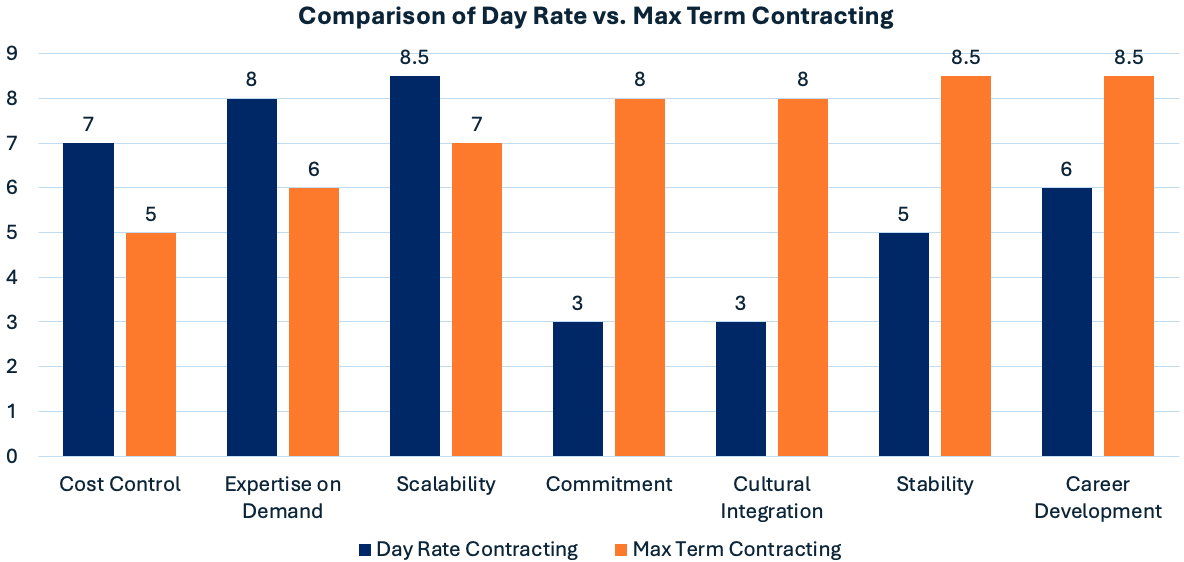Max Term vs. Day Rate Contracting: What’s Right for Your Business or Career?
Technology moves at an exponential pace, causing both companies and IT professionals to constantly explore the best ways to structure working relationships that satisfy personal needs and business needs.
Several notable Australian companies have made drastic moves in reducing their contract workforce, opting for permanent or full-time/max term contracts, resulting in one of the most debated engagement considerations being “max term contract” vs “day rate contract.”
Each offers distinct advantages and considerations, making it essential for both employers and contractors to understand the nuances before committing to one.
Each offers distinct advantages and considerations, making it essential for both employers and contractors to understand the nuances before committing to one.
What is Day Rate Contracting?
Understanding Day Rate Contracting
Day rate contracting is a popular engagement model where IT professionals are hired and paid based on the number of days they work. In theory, this arrangement offers flexibility, allowing companies to scale up or down based on project needs. However, in the Australian market, many companies expect day rate contractors to operate similarly to full-time employees, adhering to fixed schedules and delivering consistent output.
Pros for Companies:
- Cost Control: Companies can manage budgets effectively as payment is tied directly to the number of days worked, offering clarity in financial planning.
- Expertise on Demand: Businesses can bring in specialised skills for specific tasks without the long-term commitment of permanent employment.
- Scalability: This model allows companies to adjust the workforce according to project demands, adding or reducing contractors as needed.
Cons for Companies:
- Potential Misalignment: Expecting day rate contractors to perform as full-time employees can lead to conflicts in expectations and job satisfaction.
- Higher Short-Term Costs: While scalable, day rate contractors can be more expensive in the short term compared to fixed-term contracts.
Pros for Contractors:
- Higher Earning Potential: Day rates almost always exceed pro-rated salaries for full-time employees, particularly in high-demand areas of IT.
- Diverse Experience: Contractors can gain varied experience by working with different companies, though this may be limited by the expectations placed on them.
Cons for Contractors:
- Limited Autonomy: In Australia, day rate contractors are often expected to work like employees, which can restrict the autonomy typically associated with contracting.
- Income Uncertainty: The lack of a guaranteed number of days worked can lead to unpredictable income streams.
- Lack of Benefits: Day rate contracts usually do not include benefits like paid leave, superannuation, or health insurance, which are often reserved for permanent employees.
What is Max Term Contracting?
Understanding Max Term Contracting
Max term contracting involves engaging an IT professional for a fixed term, often with a clear end date but within a longer timeframe than day rate contracts. This model provides a middle ground between permanent employment and short-term day rate contracting.
Pros for Companies:
- Cost Predictability: Fixed-term contracts allow for better long-term budget planning and financial forecasting.
- Commitment: Contractors are more likely to be committed to a project’s success, given the longer engagement.
- Cultural Integration: With more time in the company, max term contractors can better integrate into the team and company culture.
Cons for Companies:
- Less Flexibility: Companies are locked into the contract for the term, even if project needs change.
- Potential Higher Costs: If the project ends early, companies may still be liable for the contract's duration unless there are exit clauses.
- Onboarding and Offboarding: Longer-term contracts require more resources for onboarding and offboarding, similar to permanent staff.
- Access to Talent: Highly skilled and in-demand workers often prefer day rate contracting because of the higher earning potential. This means companies relying on max term contracts may miss out on some of the top talent in the market.
- Inconsistency: If not clearly managed, the engagement can lead to inconsistencies in project delivery, particularly if the contractor has external assignments.
Pros for Contractors:
- Stability: Max term contracts offer more predictable income over an extended period, providing financial security.
- Career Development: Longer engagements allow contractors to develop deeper relationships and contribute meaningfully to a project’s success.
- Potential Benefits: Some max term contracts include benefits typically reserved for permanent employees.
Cons for Contractors:
- Reduced Flexibility: Contractors have less freedom to take on other work or exit the contract early without penalties.
- Potential Lower Earnings: Max term contracts may offer lower day rates than short-term contracts, impacting overall earnings.
- Risk of Stagnation: Staying with one company for an extended period can limit exposure to diverse experiences and technologies.

Which is Right for You?
Both day rate and max term contracting offer unique benefits and challenges. For companies, the choice depends on the specific needs of the project, budget considerations, and the desired level of contractor commitment. For IT professionals, it’s crucial to weigh the benefits of potential higher earnings and diverse experiences against the reality that many companies expect day rate contractors to work like full-time employees. Is this what you’re looking for in a contracting role?
As you navigate these options, consider what other factors should influence your decision. How does the company culture align with your working style? What are your long-term career goals? Understanding the full scope of your needs and objectives will guide you to the best choice.
This article aims to equip technology hiring managers and IT professionals with the insights needed to make informed decisions. Whether you’re looking to engage a contractor or explore new job options, consider the pros and cons of each model to find the right fit for your business or career.
If you’re weighing the benefits of max term vs. day rate contracting, let’s explore how 4impact can help you make the right choice for your business or career. Let’s talk.
